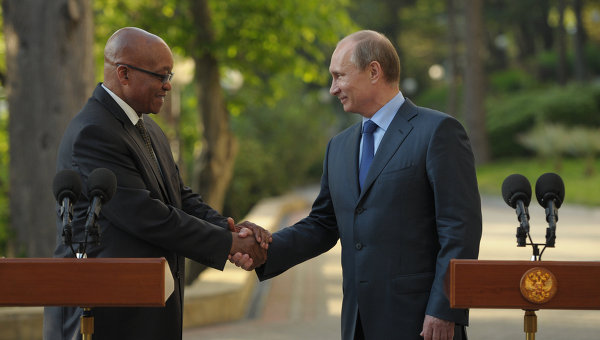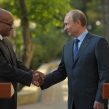
Russia’s Heightened Interest in Africa
Publication: Eurasia Daily Monitor Volume: 10 Issue: 111
By:

The Soviet Union conducted a robust policy toward Africa, but that ended with the collapse of the Union of Soviet Socialist Republics. As Russian analysts today admit, Africa, relatively speaking, fell off the map of Russian foreign policy after 1991. It is only in the last few years that Russian interest and presence (at least at the official and formally legal level of relations) has returned to this continent. Enhanced capability certainly contributes to this revival of interest, but strategic reasons also exist.
African resources attract Russian elites because they are relatively unexplored and can contribute to Russia’s wealth, political influence and ability to affect European natural gas policy, (e.g.: in countries like Algeria and previously Libya, which are sources of gas for Western Europe). Likewise, Russian arms sales to Africa—especially with the Libyan and Iranian markets no longer accessible—become more interesting to Russia’s defense industry, since there are clearly many conflicts in both Sub-Saharan and North Africa. Third, Russian leaders view insurgencies and terrorist operations in Mali as being linked to Libya and Western support for the Libyan rebels and wants to take a strong stand against them, certainly with Syria in mind (RT, January 25). Therefore Moscow is very concerned that a proper and successful UN peacekeeping operation takes root there (Rossiya 24 TV, April 29).
Fourth, Russia must show its presence in Africa if it is to conduct a truly global foreign policy as it invariably says it does (www.mid.ru. February 13, 2012). On this basis, Moscow now fears being marginalized in Africa and attends key summits in order to ensure that its presence and interests are represented. Thus it maintains a regular dialogue with the African Union (Interfax, April 29).
But beyond these “principled” and tangible material reasons for growing Russian interest in Russia, other motivations are also discernible. For some time, Russia has been concerned with China’s quickly growing presence in Africa. In 2011, Foreign Minister Sergei Lavrov pointed out that Russian trade turnover with Africa was $4 billion, while China’s was $120 Billion (Valdai club, November 7, 2011). And that situation has not changed, convincing Moscow that it must step up its activities in African countries.
South Africa’s entry into the BRICS organization of emerging powers—also comprising Russia, Brazil, India and China—offers Moscow an opportunity for such actions. In advance of the recent BRICS summit in Durban, Russia and South Africa agreed to create an OPEC-like cartel for platinum (Bloomberg, March 26). At this summit, Russia also signed major energy, trade and military deals with South Africa, including offering it credits to buy Russian nuclear reactors (RT, March 27). President Vladimir Putin and his South African counterpart, Jacob Zuma, also agreed that South Africa will help Russia maintain the Global Navigation Satellite System (GLONASS)—Russia’s domestically produced alternative to the United States’ satellite-based Global Position System (GPS). “A quantum-optical system will be established in South Africa to increase the accuracy of GLONASS signal reception in the Southern Hemisphere,” Putin told journalists at the press conference. Putin added that the Space Center in South Africa will be used to retrieve data from Russian satellites according to the “Radioastron” Project. Finally, the Russian president also talked about substantially increasing bilateral trade (RT, March 27). Since then, Putin has reiterated that Russia is prepared to assist South Africa in developing a “comprehensive nuclear power industry” (presstv.ir, May 17). The two countries’ heads of state held further face-to-face talks in May 2013, which extended these agreements (indrus.in, May 20).
Meanwhile Moscow is also continuing its offensive against Western influence and desires to intervene in troubled North African and Middle Eastern states, denouncing such operations as leading to the prospect of Islamist takeovers. At the recent Russian conference on European security, held in Moscow on May 23–24 (see EDM, May 28, 31), the Russian General Staff inveighed against attempts to “impose” Western standards of government on these countries (Voice of Russia, May 23). Russian diplomats also periodically call for the creation of a diplomatic mechanism to bring peace to the conflict known as the Great Lakes War in Sub-Saharan Africa (Voice of Russia, February 21). Such initiatives are part of the larger effort by Russia to assert a lasting political and diplomatic presence in Africa.
However, all these manifestations of rising interests, investments, arms sales, diplomatic and trade initiatives, as well as efforts to warn the West off of intervention represent only the formal or what might be called the “official” side of Russian policy in Africa. Hidden from view and much more difficult to discern, but no less real, is the large-scale effort to run guns and resources to and from Africa. Such Russian efforts serve to destabilize pro-Western states there, make money, gain influence and access to resources, and so on. Yet, this aspect of Russian policy in Africa still awaits its analysts.




